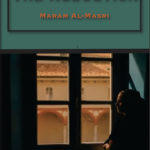 Maram Al-Masri
Maram Al-Masri
Poetry from The Abduction (forthcoming from White Pine Press in Spring 2023)
Translated by Hélène Cardona
The Abduction refers to an autobiographical event in Maram Al-Masri’s life. When, as a young Arab woman living in France, she decides to separate from her husband with whom she has a child, the father kidnaps the baby and returns to Syria. Al-Masri won’t see her son for thirteen years. This is the story of a woman denied the basic right to raise her child. These are haunting, spellbinding poems of love, despair, and hope, a delicate, profound and powerful book on intimacy, a mother’s rights, war, exile, and freedom. Maram Al-Masri embodies the voice of all parents, who one day, for whatever the reason, have been forcibly separated from their loved ones. She writes about the status of women, seeking to reconcile her role as a mother with her writing work. The terrible war that has devastated her native country since 2011 has painfully affected her.
O human brothers
O human brothers
O world
I had a child
I hid him in my belly
He shared my body
I nourished him with my blood
I shared my dreams with him
I sang for him, he smiled
I carried him, he stopped crying
He was torn him from my arms
I stopped singing
War rages in Rwanda
War rages in Rwanda
and me, I eat
War rages in Yugoslavia
and me, I smile
War rages in Palestine
and me, I sleep
but since you were kidnapped
war rages within me
If I smile while you’re away
If I smile while you’re away
it means a shadow
has passed in front of me
you in white layers
and the toy you drag behind
if I smile while you’re away
it doesn’t mean I’ve forgotten you
but sometimes
it means
your presence
even thousands of miles away
can bring me happiness
Translator’s Statement
I selected Maram Al-Masri’s work because her unique, authentic and healing voice is desperately needed in light of the horrendous wars ravaging Syria and the devastating plight of its refugees worldwide.
I discovered Maram when I read and translated Gabriel Arnou-Laujeac’s Plus loin qu’ailleurs, for which she wrote the superb French introduction. I fell in love with her lyrical poetry and Gabriel put us in touch. I met her in Paris and have been working closely with her. She wrote the original in Arabic and French, so we’ve been able to discuss all the nuances.
As a translator I see myself as intermediary, technician, and alchemist working between languages to create inspired texts spanning cultural differences, geographic distances, and time. What I strive for is to capture the essence of the poem while remaining as close as possible to it, knowing that I’m creating a new piece at the same time. My goal is to transcend the original and give it its own voice in English. Translation is also a love affair. When you understand and know other cultures, you don’t fear the other. There is no other. Translation is necessary to know oneself – to know where one comes from.
Every language is a key into the psyche of its people. I couldn’t agree more with Anne Michaels when she writes, “Translation is a kind of transubstantiation; one poem becomes another.” Translation is a craft. It is also an inspired act, a negotiation. To quote Henry James, “We work in the dark,” from that intuitive place. It becomes an act of revelation, the ultimate act of sympathy.”
Hélène Cardona
Hélène Cardona’s books include Life in Suspension and Dreaming My Animal Selves (Salmon Poetry) and the translations The Abduction (Maram Al-Masri, White Pine Press), Birnam Wood (José Manuel Cardona, Salmon Poetry), Beyond Elsewhere (Gabriel Arnou-Laujeac, White Pine Press), Ce que nous portons (Dorianne Laux, Éditions du Cygne), and Walt Whitman’s Civil War Writings for WhitmanWeb. The recipient of over 20 honors & awards, including the Independent Press Award, International Book Award and Hemingway Grant, she holds an MA in American Literature from the Sorbonne, worked as a translator for the Canadian Embassy, and taught at Hamilton College and LMU.
Maram Al-Masri
Maram Al-Masri was born in Latakia, Syria, and moved to France following the completion of English Literature studies at Damascus University. She is the recipient of many prestigious literary prizes, including the Prix d’Automne de Poésie de la Société des Gens De Lettres, the Adonis Prize, the Premio Citta di Calopezzati, Il Fiore d’Argento, and the Dante Alighieri Prize. Her collections include Je te regarde, Cerise rouge sur un carrelage blanc, Par la fontaine de ma bouche, Elle va nue la liberté, Je te menace d’une colombe blanche, Le Rapt, and two anthologies, including Femmes poètes du monde arabe.
